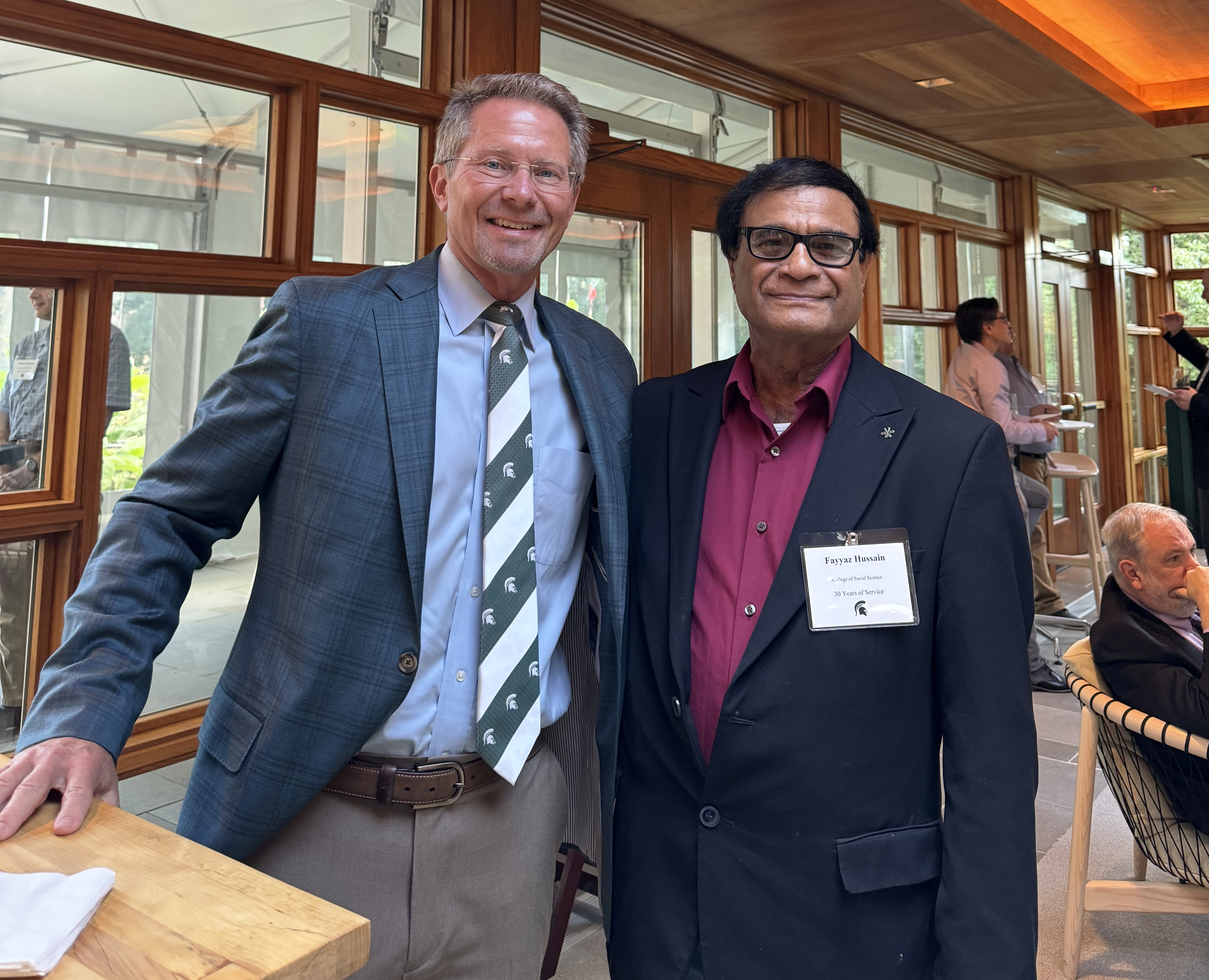Professor Fayyaz Hussain celebrates 30 years of teaching at Michigan State University
October 18, 2024 - Patti McDonald

Michigan State University President Kevin M. Guskiewicz (left) and Professor Fayyaz Hussain
at Cowles House reception.
Michigan State University President Kevin M. Guskiewicz (left) and Professor Dr. Fayyaz Hussain.
In 1986, Dr. Fayyaz Hussain, currently a Professor at Michigan State University, embarked on his academic journey with only $350 to his name as a graduate student majoring in sociology. This year, he celebrates 30 years of teaching at MSU and reflects on his profound appreciation for the university where his journey began.
“I have a real emotional attachment to MSU; I have spent most of my life here,” Hussain said. “I feel so honored to be a part of MSU.”
Dr. Hussain received numerous awards throughout his tenure at MSU, such as the John F. Schnabel Teaching Award presented by the North Central Sociological Association (NCSA) and MSU’s Excellence in Teaching Award. In 2020, he was elected to the position of President of the NCSA for the 2021-2022 term. Additionally, in 2023, he was the recipient of the Tomeh Award from the NCSA. The Tomeh Award is given annually to recognize an NCSA member who has demonstrated outstanding service to the association, either through a single exceptional activity or throughout his/her professional career. He also received distinguished Alumni Award from Punjab University, Lahore, Pakistan.
“Being able to serve as the president of NCSA was such an honor,” Hussain said. “As one of the few minorities to serve as president in NCSA’s more than 100 years history, it really is something I am proud of.”
In 2023, Hussain received a Fulbright for his project: Critical Analysis of Violence Against Women in South Asia Focus on Pakistan (Pakistan). He spent several months in Pakistan over the summer leading talks at multiple universities in Pakistan and conducting research related to gender studies.
Hussain said he uses his own life experiences to inspire and educate his students in class. He uses his paper, Creative Use of Stories as a Pedagogical Tool in the Classroom (Sociological Focus, 2017) as a guide for how he teaches his classes.
“I use my life experiences as pedagogical tools in my classes,” Hussain said. “So, I use lot of stories, including my own personal stories as a minority and someone who is from another country to teach my students certain concepts and topics in class. I have found this to be engaging, and the students can relate it to their own lives.”
This semester, Hussain is teaching three sections of ISS 215: Social Differentiation and Inequality, meaning he teaches students from all majors, most of whom are in their first year at MSU.
“My students are from every major and most of them might not have a background in social sciences, so I am laying down the foundation for several hundred students on our campus each semester. It is a really great learning experience for me because every year we have students with different cultures, economic backgrounds, ethnic backgrounds, different attitudes and different habits. I love being in the classroom and I value how important my job is.”
In 2014, Hussain contributed $10,000 to Michigan State University to promote student achievement by establishing an endowed scholarship specifically for freshmen and sophomores pursuing a major in Interdisciplinary Studies in Social Science (IDS). This scholarship, valued at $1,000, is available to students who exhibit significant financial need and are residents of Michigan.
Spending time with Hussain quickly reveals how he feels about his students and how they feel about him. During his tenure at MSU, Hussain estimates that he’s taught more than 50,000 students.
“My students are a big part of where I am at today,” he said. “I have such an important job of shaping young people and teaching them important lessons in life.”
Hussain is so well-liked that his students created a Facebook group to honor him where they share their favorite “Fayyaz sayings.”
“I never thought I would have a fan group, but it makes me feel like the students really connect with me and value their experience in my courses,” he said.
Hussain’s biggest piece of advice to his students? Communicate with your professor and don’t isolate yourself.
“Some classes can be really large, and it might be easy to get overwhelmed or stressed out. It is good practice to introduce yourself to your professor so that you have the best experience as a student.”

